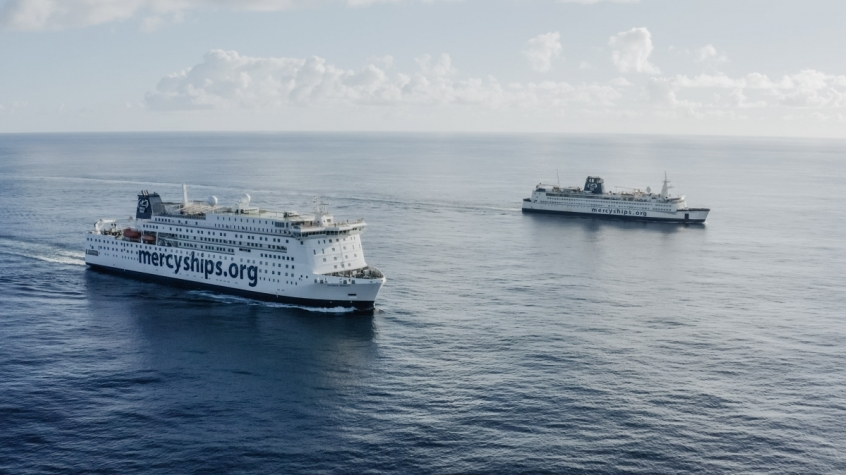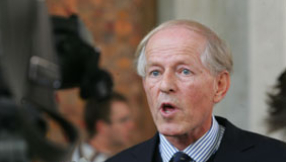
Forty-five years ago, Don and Deyon Stephens began to action a long-held dream. They wanted to convert a ship into a floating hospital, to bring safe, free surgical care to those who needed it most.
They left their home in the United States, setting out into unfamiliar waters on a journey that would transform countless lives. There were six of them: Don, Deyon, and their four children.
A small team of people who shared their vision began to grow around them and their dream started to become a reality with the purchase of an ocean-liner in Lausanne, Switzerland. Bought for its scrap value, Don and his team then converted the liner into a hospital ship, the Anastasis, over the next four years.
Today, four and a half decades later, Mercy Ships has worked in more than 55 countries, helped more than 1.2 million people see their lives changed and performed more than 110,000 life-changing surgeries.
In addition to surgical care, Mercy Ships creates lasting impact by training local medical professionals and strengthening in-country healthcare systems. The charity builds relationships with the national government and ministry of health, so that the specific needs of each country are met; working to strengthen the country's healthcare systems and drive policy change.
In 1996, Mercy Ships UK (a key member of the Mercy Ships global partnership) was founded, and the UK public's support has gone from strength to strength since.
Each year, more than 3,000 volunteers from over 60 countries serve on board the world's two largest civilian hospital ships, the Africa Mercy and the Global Mercy. Professionals such as surgeons, dentists, nurses, health trainers, cooks, and engineers dedicate their time and skills to accelerate access to safe surgical, obstetric, and anaesthetic care.
In the first half of 2023, more than 1,100 global volunteers served on board the brand-new Global Mercy in its first service in Senegal, including more than 50 from the UK. The first surgeries were performed by two consultants from Oxford in a ship made up of world citizens.
"What started as a vision or a dream with Deyon and me, now it belongs to hundreds, thousands of people," Don said.
The Early Years
Throughout the last 45 years, it hasn't been the numbers that have defined Mercy Ships. It's been the people who have served. Each individual with their own story to tell.
"I think some of the greatest people I've ever been privileged to meet are within Mercy Ships," Don said.
Three of those people are Faithful, Mary, and Esther Biney. Faithful and Mary, from Ghana, were Mercy Ships' first African crewmembers. They got married on the Anastasis, the very first Mercy Ship, in Greece. Then they welcomed their first child, Esther, on board.
Faithful recalls those as "challenging years." But time after time, they experienced the faithfulness of God as they raised their young family at sea.
"He will always provide," Faithful said.
As an adult, Esther returned to serve just as the Anastasis, her childhood home, was retired. A new era, with a much larger ship, was beginning.
"It was pretty exciting to have the ships docked side by side [in Dakar last May], and transition from the Anastasis to the Africa Mercy," Esther said. "That was something. That was incredible."
New Tools, New Reach
Today the Africa Mercy is still serving, and she's been joined by the Global Mercy, the first ever purpose-built Mercy Ship.
The newer, larger, higher-tech ship is one significant "tool" that will expand the hope and healing possible through Mercy Ships. But within her halls, many smaller tools represent countless acts of generosity, and unlimited potential.
"The equipment in our operating rooms, a lot of it is gift-in-kind donations," Don Stephens said. "Some of it we've purchased because of the generosity of our people."
Those people, both financial supporters and those Don calls "prayer partners," are the behind-the-scenes engine that keeps Mercy Ships going.
"People from around the world believe in Mercy Ships, and we have become their charity of choice," he said. "What a great honour."
Walking Blood Bank
During the Global Mercy's 2023 field service in Senegal, a surgery took place that exemplified all that Mercy Ships stands for.
"We had three nurses, three surgeons, two anesthesiologists, representing four different nations, just for one surgery," Don said.
Throughout the 18-hour surgery, the patient lost all of the blood in her body. Volunteer crewmembers donated their own blood in real time to replenish it.
"The patient now has more than seven units of blood from 15 different nations," Don said. "She's walking with the blood of the crew and even some of the doctors and people who were in the operating room."
That "walking blood bank," Don said, and the generosity of those who gave it, is a representation of the mission of Mercy Ships.
"I think that represents 45 years," he said.
As the organisation continues to grow, Don's greatest prayer is that its staff and crew will stay true to Mercy Ships' core values: to love God, love and serve others, be people of integrity, and strive for excellence in all they say and do.
Even though they started with a big dream, Don and Deyon didn't anticipate the extent of that dream's impact. However, as Don pointed out, the unimaginable is not all that surprising, given that God is "able to do immeasurably more than all we ask or imagine."
"Did I imagine all of this in the beginning?" Don said. "No. I imagined that there would be ships, plural. But Mercy Ships has grown above my wildest dreams. ... And when we see what God is doing and will continue to do, my hope is that we will have a small but significant part in the kingdom growth in the continent of Africa."
Learn more about the impact of 45 years of Mercy Ships.













